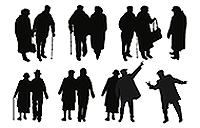York Professor William Gage has recently published an ebook that acts as a primer for people who have been diagnosed with Parkinson’s disease, members of their family or caregivers.
Don’t Fall: Parkinson’s Disease, Knowledge for Patients, Families and Caregivers to Reduce the Risk of Falling synthesizes the most up-to-date information available about Parkinson’s disease, as well as the latest research from peer-reviewed journals. The material is presented in an easy-to-navigate format for the layperson.
 “My area of expertise is balance control and walking and falls,” says Gage, associate dean, research and innovation, in the Faculty of Health. “So for me it makes sense to write about falls and the devastating impact that falls can have on a person’s quality of life, as well as the quality of life of the people around them.”
“My area of expertise is balance control and walking and falls,” says Gage, associate dean, research and innovation, in the Faculty of Health. “So for me it makes sense to write about falls and the devastating impact that falls can have on a person’s quality of life, as well as the quality of life of the people around them.”
People with Parkinson’s disease are at greater risk of falling because of the nature of the disease. The disease affects the amount of dopamine in the basal ganglia area of the brain, which helps control and initiate muscle movement. The effect of a lack of dopamine can mean slower movements and feeling frozen in place when trying to start walking. The freezing often happens when the person is trying to walk; they suddenly feel rooted to the ground and can’t move.
With these symptoms comes an increased risk of falling and, importantly, an increased risk of injury. People with Parkinson’s disease are less able to quickly protect themselves – by throwing out their arms to break their fall, for example – as those without the disease, says Gage. In addition, one study in particular pointed to reduced bone density in people with Parkinson’s disease, which would put them at a higher risk of bone fractures.
“The risk of suffering a fracture if you’re a Parkinson’s disease patient, as a result of a fall, is about twice that of your age-matched otherwise healthy person who falls,” says Gage.

The idea to write Don’t Fall: Parkinson’s Disease came after Gage received traffic from around the world on a blog post he wrote on his Don’t Fall website about falls and the risk of injury for patients with Parkinson’s. “I thought, if there is that much … I should write something a little more comprehensive and base it in research, but try to talk in a narrative voice and focus it on patients and families and caregivers,” he says. “There seemed to be a need for accessible information on the topic.”
Not only does it explain what the disease is, how it affects a person’s ability to walk and why that increases the risk of falling, it also gives people information on what they can do to help prevent falls and injury, and what to expect as the disease progresses.
Tai chi, Nordic pole walking and other forms of exercising can help with muscle strength and balance, while using assistive devices and mobility aids can help reduce the likelihood of falling. Nordic pole walking in particular has been shown to have health benefits and to increase mobility for people with Parkinson’s disease, says Gage, who hopes people will find the book informative and helpful.


